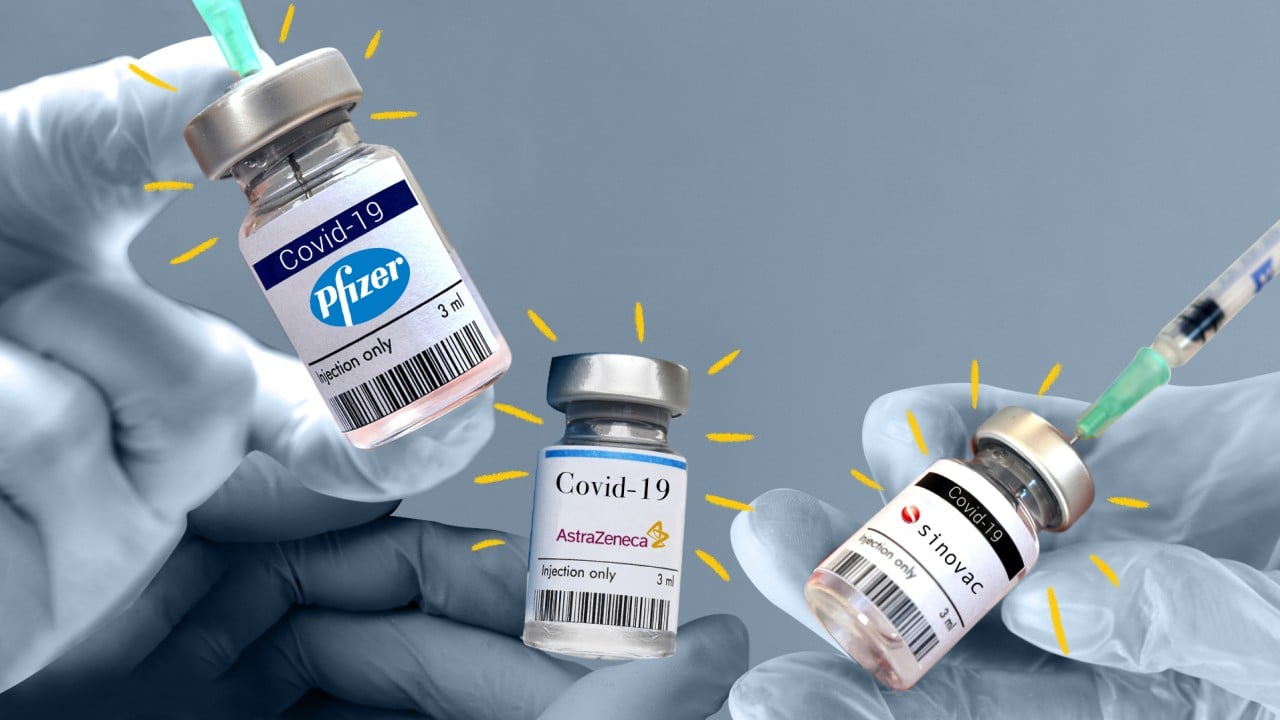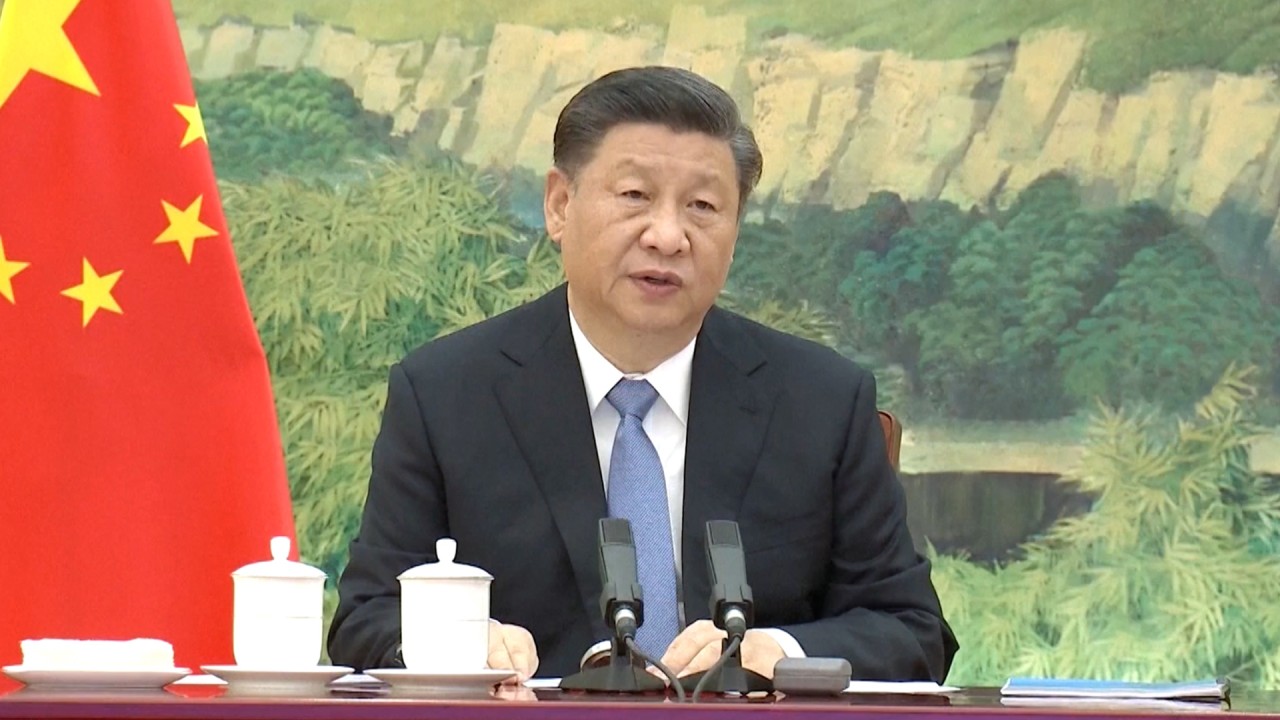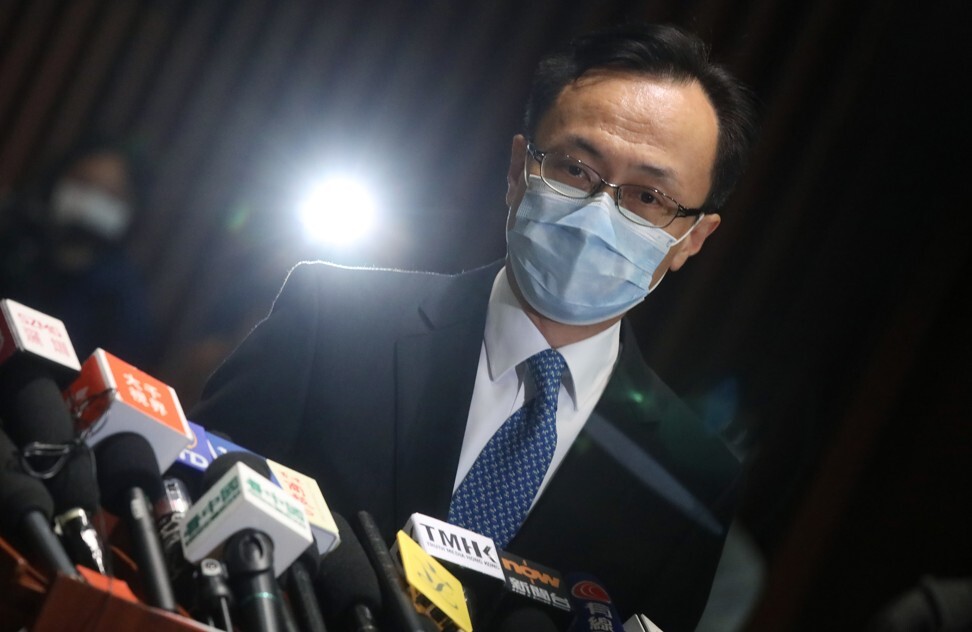
09:50
SCMP Explains: What's the difference between the major Covid-19 vaccines?

Health authorities have ordered thousands of workers helping to build a new airport runway in Hong Kong to undergo testing for the coronavirus after another five cases tied to an existing outbreak were among 28 infections revealed on Saturday.
While the caseload was the lowest in more than three weeks, the fourth wave has proved stubbornly difficult to contain, and authorities are hoping the roll-out of a vaccine will help turn the tide. The government announced the launch of a recruitment and infrastructure drive for the campaign, which is expected to start late next month.
Two of the latest infections were imported, one involving a cargo flight pilot coming from the United States and the other an arrival from Pakistan, who flew from Dubai to Bangkok. Six of the cases were untraceable, while more than 40 people tested preliminary-positive. The city’s overall tally now stands at 10,399, with 179 related deaths after a 46-year-old female patient succumbed in the evening.

09:50
SCMP Explains: What's the difference between the major Covid-19 vaccines?
Although the latest infections were the fewest since January 6, when 25 cases emerged, the Centre for Health Protection said it could not evaluate a longer-term trend based on a single day.
“Also, as the Chinese Lunar New Year is approaching, the general public may have more family gatherings and also social functions, so we need to take precautions so there will not be further large-scale transmission or outbreaks in the community,” said Dr Albert Au Ka-wing, principal medical and health officer at the centre’s communicable disease branch.
Five more construction workers at the airport were found to be carrying the virus, taking the size of the cluster to nine, with the first case emerging last week.
They worked at two different sites, and transmission was suspected to have occurred in a converted shipping container used to rest and eat, according to Au.
“It was also possible the workers did not wear masks properly at work,” Au said.
In a bid to contain the outbreak, the government ordered 3,000 workers to undergo mandatory testing and suggested the Airport Authority and contractor suspend operations at the sites for 14 days.
Among the latest cases was a nurse working at the Dr Raymond Lam Hok-suen ophthalmological clinic in Champion Building on Nathan Road, inside a designated testing zone. She submitted a sample on Thursday and last worked on Friday. She was responsible for registering patients and wore a mask while at work, Au said. The clinic will contact patients who visited the clinic between January 26 and 29 to suggest they undergo testing.
Another 11 buildings in the Yau Tsim Mong district were given mandatory testing orders after their sewage samples were found to have traces of the virus.
Hong Kong has so far struck deals to purchase 22.5 million doses of Covid-19 vaccine, with 7.5 million shots each coming from three suppliers: Sinovac Biotech; British-Swedish firm AstraZeneca; and Fosun Pharma, which is handling the BioNTech vaccine, developed by the German company and US pharmaceutical giant Pfizer.
The government on Monday authorised the BioNTech variant for emergency use, but on Friday, the European Union announced new export controls on all coronavirus vaccines in an effort to ensure timely access for all of the bloc’s citizens and to tackle a lack of transparency over their sale to foreign governments.

01:31
Xi says he is ‘worried’ about Hong Kong Covid-19 cases during virtual meeting with Carrie Lam
Makers must notify the EU when sending their shots outside the bloc, and member states will then have to authorise the exports and can block them if the supply arrangements for the union are not being met.
The government said it was highly concerned about the development and would continue to monitor the situation and ensure the new regulations did not interfere with the BioNTech supply. The government said it was aware the EU had pledged the rules would not affect the export of vaccines under advance purchase agreements.
According to civil service chief Patrick Nip Tak-kuen, the first immunisation programme would run for at least six months. The government was in talks with both public and private hospitals to prepare facilities for the task.
“There will be 18 vaccination centres – open 12 hours a day – run together by medical professionals from the Hospital Authority, Department of Health, tertiary institutions and private doctors, while we have also begun to recruit civil servants as administrative staff, so that the programme can begin once the vaccines arrive,” he told a radio programme.
Offering assurances on the scheme’s launch date, Nip said the Department of Health had been in close contact with the suppliers of the BioNTech vaccine to ensure there would be no further delays to the delivery of the first batch of jabs.
Under the government’s plans, high-risk groups will be given priority for the 1 million BioNTech doses. The first recipients will be staff and residents of care homes for the elderly, followed by hospital workers and other older people.
The government previously said vaccinations could begin after the Lunar New Year holiday in mid-February. But the plans changed following a delay to the supply of Beijing-based Sinovac’s CoronaVac, originally scheduled for delivery by the end of January.
Nip said they were still awaiting the third round of clinical data for the CoronaVac jab before making any further arrangements.
Chief Executive Carrie Lam Cheng Yuet-ngor revealed last Tuesday that she had sought Beijing’s help in securing Covid-19 shots from state-owned Sinopharm following “hiccups” in the procurement of other vaccines already bought.

Professor Ivan Hung Fan-ngai, who is advising the government on its vaccination plan, said he believed Sinovac would release the data shortly.
“We must obtain this clinical data to vet and recommend its use,” he said. “But I believe Sinovac and the other mainland vaccine Sinopharm are preparing their reports and [they] will soon be published. The public does not have to worry that they will take very long.”
Hung saiddata revealed a 95 per cent efficacy rate for the BioNTechvaccine and that it should be safe for the public. But he observed the advisory board had also noticed side effects, including 15 per cent of those vaccinated experiencing fever.
“We are closely monitoring different sets of data, especially when a lot of US and Israel citizens have been vaccinated already. We are evaluating the effects on elderly that are hospitalised,” he added.
Dr Thomas Tsang Ho-fai, another member of the government’s vaccination task force, concurred the board could not begin the approval process for the Sinovac jab without the data.
He added that although the company had submitted data to the World Health Organization, local health departments were still awaiting the figures.
Separately, minister Nip hinted the government would continue to carry out operations similar to the three lockdowns imposed in the past week, saying they were effective in controlling the Covid-19 crisis. Future lockdowns would likely be on a smaller scale, he added.
The operations restricted the public’s movements in coronavirus-hit areas to allow for comprehensive testing.
While the 44-hour lockdown in Jordan affected a larger community, the ones in Yau Ma Tei and North Point targeted only a few buildings and were completed overnight.